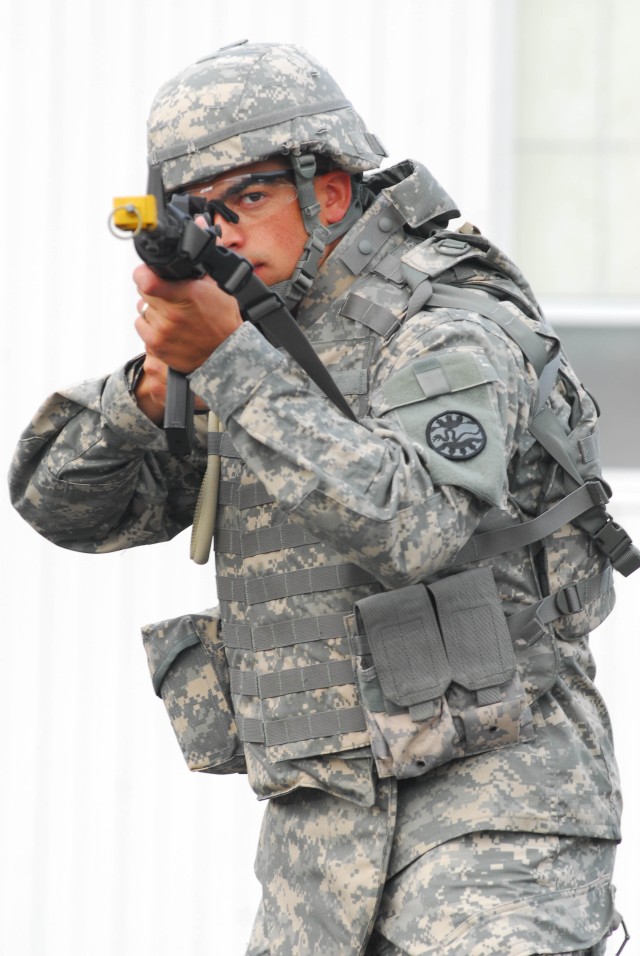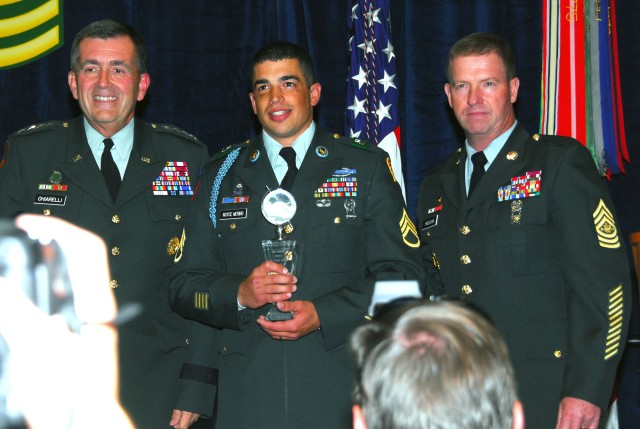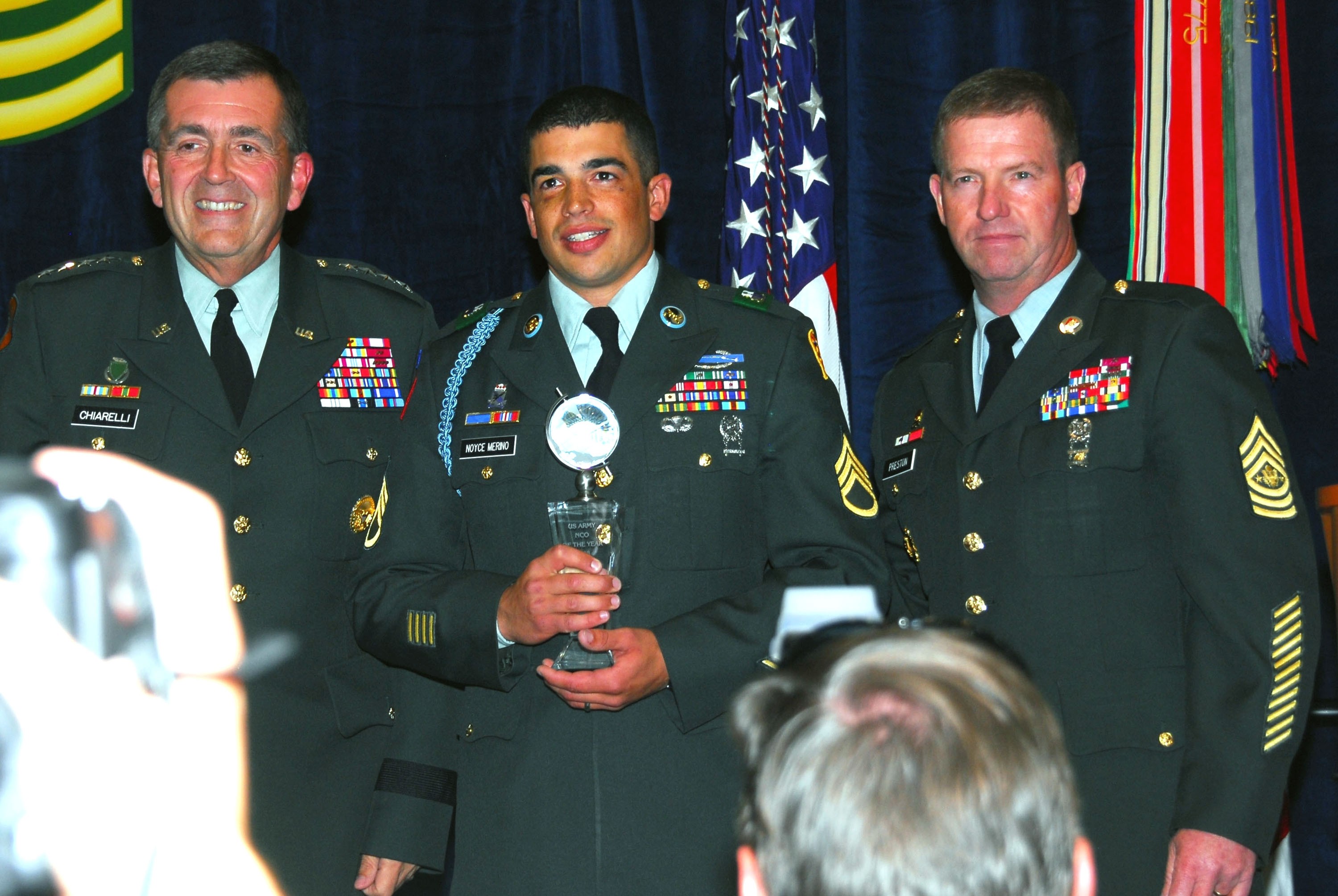When Staff Sgt. Michael Noyce Merino agreed to go before his unit's Noncommissioned Officer of the Year board last year, he had no idea what he was getting into, no idea that he would soon be an ambassador for the Army and an example for NCOs and other Soldiers worldwide.
He wasn't new to the idea, however. As a private in the 82nd Airborne Division in 2002, Noyce Merino had won Soldier of the Quarter at both the battalion and brigade levels. He also remembered reading about the Army's Best Warrior Competition in the "Army Times," and how impressed he was that the Soldier and NCO of the Year got to go up on stage with the sergeant major of the Army.
"I thought that was so exciting, and I thought, 'Wow, how long would it take a person to get all the way to that level' How many different things do they have to do to get there' That's just amazing.' I was very fascinated by that," he recalled, but a deployment to Afghanistan and then two to Iraq put that dream on hold.
When his platoon sergeant asked him to participate in the unit-level NCO competition last year, Noyce Merino, now in the Montana National Guard, remembered the thrill he felt years earlier. As a Soldier, he had no choice but to say yes, even though he was already working two jobs and attending school full time, in addition to serving in the Guard.
One thing led to another, and Noyce Merino won at each level: first his unit, then the state of Montana, then the Northwest region, then the National Guard level. He soon found himself putting school and work on hold to prepare, spending two hours a day, five days a week working out.
"It was kind of odd, because every time I would win, I would be so happy and excited," he said. "I thought it was just the most amazing thing that I won the state of Montana. It was so huge. And I was happy for a few minutes, and then I thought, 'Wow, I've got to get ready for the next competition,' and all the work started again. I didn't have much time to enjoy it.
"I understood the sacrifice and commitment that it required, but at every point, I forgot about everything. I forgot about the cost and focused on the competition. I'm so competitive naturally, that even if I'd wanted to, I couldn't have done any less than I did. I wanted to win just because of what that meant," he continued.
Each competition level became more and more demanding. The unit level consisted of only a physical-fitness test, board appearance and written test, while regional competitions added military skills like rifle qualification and first aid.
The National Guard level, however, was different. Noyce Merino compared it to a mini-Ranger school with a five-mile run and a 12-mile march, which he said was the hardest thing he's ever done. In combat water-survival tests, competitors were thrown in with uniforms, boots and gear and had to get out and swim for a certain distance. In another test, Noyce Merino had to jump off a 10-foot-high diving board blindfolded and holding his weapon. It was so challenging, in fact, that the Army-wide competition was easier than he expected.
"I imagined that the Army's Best Warrior was going to be more demanding than the National Guard. But...I was probably in the best shape I've ever been in between the National Guard competition and the Army competition, so that helped me a lot," Noyce Merino said.
He explained that as a result, the most challenging aspect of the Best Warrior competition was the board appearance and the pressure of appearing before Sergeant Major of the Army Kenneth O. Preston and other top enlisted leaders. The best part, he added, was the night-fire range, because in addition to being good training, it looked cool lit up with flares.
In previous competitions, Noyce Merino had guessed that he would finish in one of the top two spots, but he had no idea that he won the Army competition. In fact, he thought he would be in third or fourth place, partly because a National Guard Soldier had never won the Army's Best Warrior.
He had even picked out a couple other NCOs he thought might win, so when his name was announced as the NCO of the Year during the Association of the United States Army's annual meeting in October, Noyce Merino was shocked.
"When they said my name, (my wife) said I turned as white as a ghost and wouldn't get up," Noyce Merino said. "She had to pull me up off my chair and kind of push me on stage. I was extremely surprised. I didn't think it was real. I felt like I was dreaming. It was all happening around me and I was kind of looking at myself from the outside. I thought I would wake up any second.
"At first, I was so honored and so happy, but then I started to get emotional. I almost started crying because it meant so much. It was like the pinnacle of my Army career. It validated my whole time as a Soldier, everything I've ever done, all the work that I did to get to that point. It was all worth it. It was very emotional for me."
Winning may have been a dream come true, but Noyce Merino is the first person to point out that being the NCO of the Year doesn't make him the Army's only good NCO, or even the best.
"There are people who I was going up against who were smarter than I was, who were in better shape than I was, who had more combat experience than I did. The only thing I had that set me apart from them was that I wanted it more," he said.
"Out of all the people who were able to compete, I won," he continued. "But we have NCOs and Soldiers who are doing their jobs and don't have the opportunity to compete. I always say that the best NCO is a guy who's in Iraq right now, leading his squad door-to-door and doing his mission. That's the best NCO."
Noyce Merino knows what that job entails and how important it is to the Army because he's been there. He was promoted to sergeant during his second deployment, and first to Iraq, in 2003. Pinning on those stripes was "the most solemn responsibility" he's ever had, because he knew his squad would trust him with their lives.
"I have Soldiers I'm responsible for and I have a mission I'm responsible for," he said. "I always say that the leader-especially the small-unit leader like the NCO-his job is to take the Army's mission and make it his own mission. He takes ownership of that mission, and he takes the concerns of the Soldier and the Army's mission and he brings those two things together and makes it work."
Noyce Merino said NCOs are the glue that holds the Army together, making sure Soldiers complete the mission officers have assigned. He cited the Soviet campaign in Afghanistan in the 1980s as an example: the Soviet army didn't have enough NCOs, so when something went wrong in the field, soldiers panicked and didn't know what to do.
"If that would have happened today, a staff sergeant, a sergeant first class or a sergeant would step up and say, 'You go there, you go there. Fight, defend, win,' and that wouldn't happen. So that's why the noncommissioned officer is so important. There's a huge gap between an entry-level Soldier and an officer, and that's what a noncommissioned officer fills," Noyce Merino explained.
That's why he said he believes NCOs should essentially own their units and run them without interference. When there's something wrong with a unit, he said that he immediately looks at the NCOs, because that usually means they're not doing their jobs: to set good examples and train, train, train their Soldiers, and then train them some more. Ultimately, that training will be the difference between life and death in combat, something he knows from experience.
During his second deployment to Iraq in 2006, Noyce Merino had to call on his training to get wounded Soldiers out of harm's way. When his platoon and a group of Iraqi soldiers responded to an incident, insurgents attacked with mortars and wounded seven of 13 Soldiers. One Soldier in Noyce Merino's vehicle was badly injured with shrapnel in his legs. Noyce Merino was able to treat him and everyone made it to safety-because of training.
"I always wondered what would happen when I got in a situation like that," he said. "I always thought I'd be nervous and scared and I wasn't. I was actually really, really calm. I just did what I was trained to do. A lot of people came up to me afterwards and said, 'When everything went crazy, you were steady. You did the right thing and everyone appreciated that.' I was really surprised. I was calm at the time, and later of course, it really hit me.
"You can't train too much. You can't. The more you train, the better your chances of being successful, the more your chances of surviving battlefield conditions. The experience that I had, if I hadn't had the training, I would have panicked and a friend of mine might have died. But because I had trained and because I had practice, because I'd simulated these kinds of things, I knew exactly what to do. It was second nature to me, and that's what training does. You should train every minute you have," Noyce Merino said.
Today, his mission is far different. Instead of training Soldiers, he is spending the year traveling around the country and representing the Army, the National Guard and all NCOs, a task he called both humbling and an honor.
Being an NCO, Noyce Merino said, has changed him as a person. "(It's) made a lasting impact on my life. I feel like the lessons I've learned from being a leader in the Army will stay with me forever."




Social Sharing